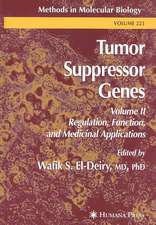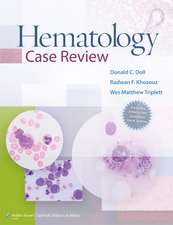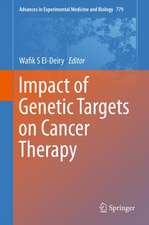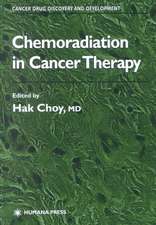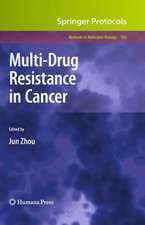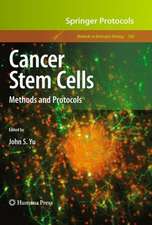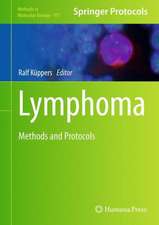Death Receptors in Cancer Therapy: Cancer Drug Discovery and Development
Editat de Wafik S. El-Deiryen Limba Engleză Hardback – 3 dec 2004
| Toate formatele și edițiile | Preț | Express |
|---|---|---|
| Paperback (1) | 789.04 lei 6-8 săpt. | |
| Humana Press Inc. – 19 noi 2010 | 789.04 lei 6-8 săpt. | |
| Hardback (1) | 1119.10 lei 6-8 săpt. | |
| Humana Press Inc. – 3 dec 2004 | 1119.10 lei 6-8 săpt. |
Din seria Cancer Drug Discovery and Development
- 5%
 Preț: 1474.98 lei
Preț: 1474.98 lei - 5%
 Preț: 1108.35 lei
Preț: 1108.35 lei - 5%
 Preț: 1415.75 lei
Preț: 1415.75 lei - 5%
 Preț: 1370.19 lei
Preț: 1370.19 lei - 5%
 Preț: 1452.28 lei
Preț: 1452.28 lei - 5%
 Preț: 1316.74 lei
Preț: 1316.74 lei - 5%
 Preț: 1439.50 lei
Preț: 1439.50 lei - 5%
 Preț: 1113.63 lei
Preț: 1113.63 lei - 5%
 Preț: 1126.24 lei
Preț: 1126.24 lei - 24%
 Preț: 1037.59 lei
Preț: 1037.59 lei - 5%
 Preț: 1466.37 lei
Preț: 1466.37 lei - 5%
 Preț: 1350.78 lei
Preț: 1350.78 lei - 5%
 Preț: 1417.54 lei
Preț: 1417.54 lei - 5%
 Preț: 1113.46 lei
Preț: 1113.46 lei - 5%
 Preț: 1428.54 lei
Preț: 1428.54 lei - 5%
 Preț: 1429.80 lei
Preț: 1429.80 lei - 5%
 Preț: 782.10 lei
Preț: 782.10 lei - 5%
 Preț: 1438.58 lei
Preț: 1438.58 lei - 5%
 Preț: 1110.32 lei
Preț: 1110.32 lei - 5%
 Preț: 1434.39 lei
Preț: 1434.39 lei - 5%
 Preț: 1365.82 lei
Preț: 1365.82 lei - 5%
 Preț: 1461.08 lei
Preț: 1461.08 lei - 5%
 Preț: 1106.86 lei
Preț: 1106.86 lei - 5%
 Preț: 982.18 lei
Preț: 982.18 lei - 5%
 Preț: 727.80 lei
Preț: 727.80 lei - 5%
 Preț: 1331.76 lei
Preț: 1331.76 lei - 5%
 Preț: 1297.40 lei
Preț: 1297.40 lei - 5%
 Preț: 1124.59 lei
Preț: 1124.59 lei - 5%
 Preț: 1433.10 lei
Preț: 1433.10 lei - 5%
 Preț: 1110.90 lei
Preț: 1110.90 lei - 5%
 Preț: 1317.76 lei
Preț: 1317.76 lei - 5%
 Preț: 1464.91 lei
Preț: 1464.91 lei - 5%
 Preț: 1939.63 lei
Preț: 1939.63 lei - 5%
 Preț: 1418.48 lei
Preț: 1418.48 lei - 5%
 Preț: 1438.94 lei
Preț: 1438.94 lei - 5%
 Preț: 1100.30 lei
Preț: 1100.30 lei - 5%
 Preț: 1109.96 lei
Preț: 1109.96 lei - 5%
 Preț: 990.58 lei
Preț: 990.58 lei - 5%
 Preț: 1443.13 lei
Preț: 1443.13 lei - 5%
 Preț: 1428.91 lei
Preț: 1428.91 lei - 5%
 Preț: 787.58 lei
Preț: 787.58 lei - 5%
 Preț: 1311.72 lei
Preț: 1311.72 lei - 5%
 Preț: 1331.76 lei
Preț: 1331.76 lei - 5%
 Preț: 1113.11 lei
Preț: 1113.11 lei - 5%
 Preț: 1440.76 lei
Preț: 1440.76 lei
Preț: 1119.10 lei
Preț vechi: 1178.01 lei
-5% Nou
Puncte Express: 1679
Preț estimativ în valută:
214.13€ • 224.21$ • 177.61£
214.13€ • 224.21$ • 177.61£
Carte tipărită la comandă
Livrare economică 09-23 aprilie
Preluare comenzi: 021 569.72.76
Specificații
ISBN-13: 9781588291721
ISBN-10: 1588291723
Pagini: 374
Ilustrații: XII, 374 p.
Dimensiuni: 178 x 254 x 27 mm
Greutate: 1.03 kg
Ediția:2005
Editura: Humana Press Inc.
Colecția Humana
Seria Cancer Drug Discovery and Development
Locul publicării:Totowa, NJ, United States
ISBN-10: 1588291723
Pagini: 374
Ilustrații: XII, 374 p.
Dimensiuni: 178 x 254 x 27 mm
Greutate: 1.03 kg
Ediția:2005
Editura: Humana Press Inc.
Colecția Humana
Seria Cancer Drug Discovery and Development
Locul publicării:Totowa, NJ, United States
Public țintă
Professional/practitionerCuprins
Mammalian Cell Death Pathways.- Resistance to Apoptosis in Cancer Therapy.- Structures of TNF Receptors and Their Interactions With Ligands.- Death Receptor Signaling in Embryonic Ectodermal Development.- Adaptor Proteins in Death Receptor Signaling.- Caspase Activation by the Extrinsic Pathway.- Death Signaling and Therapeutic Applications of TRAIL.- Death Receptor Mutations.- Regulation of Death Receptors.- Regulation of Trail Receptor Expression in Human Melanoma.- Regulation of Death Receptors by Synthetic Retinoids.- Role of p53 in Regulation of Death Receptors.- Proapoptotic Gene Silencing Via Methylation in Human Tumors.- Regulation of Death Receptor-Induced Apoptosis by NF-?B and Interferon Signaling Pathways.- TRAIL in Cancer Therapy.- Expression and Regulation of Death Receptors in Multiple Myeloma and Prostate Carcinoma.- Regulation of TRAIL-Induced Apoptosis by Transcriptional Factors.- Sensitizing Tumor Cells by Targeting Death Receptor Signaling Inhibitors.- Ceramide, Ceramidase, and FasL Gene Therapy in Prostate Cancer.- Gene Therapy Targeting Receptor-Mediated Cell Death to Cancers.- Combination of Chemotherapy and Death Ligands in Cancer Therapy.
Recenzii
From the reviews:
"The book is resourceful for both basic scientists and clinicians, who are interested in developing targeted therapies for cancer. … the book is a valuable tool for researchers as well as to those of us involved in teaching apoptosis to undergraduate and graduate students." (Harikrishna Nakshatri, Leukemia Research, 2005)
"The book is resourceful for both basic scientists and clinicians, who are interested in developing targeted therapies for cancer. … the book is a valuable tool for researchers as well as to those of us involved in teaching apoptosis to undergraduate and graduate students." (Harikrishna Nakshatri, Leukemia Research, 2005)
Textul de pe ultima copertă
Cell death, or apoptosis, plays an important role in biological processes and disease and offers special opportunities to develop new therapies for cancer, autoimmune disease, stroke, heart attack, and Alzheimer's disease. In Death Receptors in Cancer Therapy, leading physician-scientists and basic researchers review in depth our latest understanding of the molecular events that regulate cell death, illuminating those molecules that provide targets for agonists or antagonists designed to modulate death signaling for therapeutic purposes. The authors focus on the extrinsic system of death receptors, their regulation and function, and their abnormalities in cancer. Topics of particlar interest include resistance to apoptosis, TRAIL signaling, death receptors in embryonic development, mechanisms of caspase activation, and death receptor mutations in cancer. Additional chapters address death signaling in melanoma, synthetic retinoids and death receptors, the role of p53 in death receptor regulation, immune suppression of cancer, and combination therapy with death ligands.
Authoritative and up-to-date, Death Receptors in Cancer Therapy offers a timely compendium of cell death signaling pathways for those seeking either a basic understanding of apoptosis or the knowledge needed to develop new therapeutics that will activate or block death signaling in disease.
Authoritative and up-to-date, Death Receptors in Cancer Therapy offers a timely compendium of cell death signaling pathways for those seeking either a basic understanding of apoptosis or the knowledge needed to develop new therapeutics that will activate or block death signaling in disease.
Caracteristici
Includes supplementary material: sn.pub/extras

